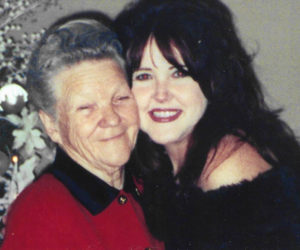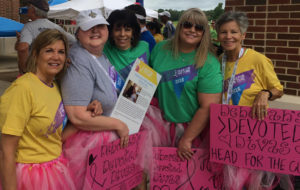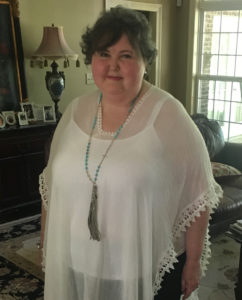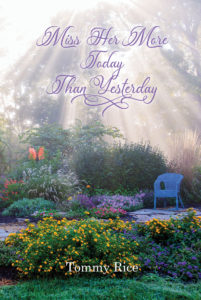By KATIE EUBANKS
Writing love songs for the wife he lost
He knows he’ll see her again — for now, he’s sharing their story
Longtime realtor Tommy Rice of Raymond lost the love of his earthly life in January 2019 when his wife, Deborah, succumbed to cancer. While grieving, he wrote two beautiful tributes to her: a book, and a collection of songs, one of which has already charted.
MCL Editor Katie Eubanks talked to Tommy about he and Deborah’s journey, how God led him to these creative projects in her memory, and how he hopes they will touch others.
Katie Eubanks: You and Deborah met at a divorce care group, right?

Deborah and her mom, Billie Faye Johnson. Deborah came from a prominent family, but “money was not her thing,” Tommy said.
Tommy Rice: Yes. It was at First Baptist Church downtown (in September 1999). I wasn’t really looking for anybody. We became the best of friends (before we started dating).
She was a mortgage banker. She came from a very prominent family in Louisiana, in Monroe. But they all lived just normal lives. Money was not her thing.
Her life revolved around God and me and her family. (After we married) she never left the house unless we had a devotional (first). We always had our devotional and held hands. That’s what made the marriage so strong.
At night you couldn’t wait to come home to her, because you didn’t want to leave her. Those were the best 20 years of my life.
KE: When was she diagnosed?
TR: The first problem we had was on April 4, 2016 — we had come back from a family reunion, and she couldn’t read (our) devotional. We went to St. Dominic. They rushed her to the back.
The doctor came in and said she had a large brain tumor on the left side, above her eyes. On April 6, my birthday, we took the tumor out.
On April the 9th, the doctor walked in the room, the brain surgeon, and said it was glioblastoma. That’s the worst cancer you can have. He gave her three to six months.
We fought with everything we had.

Tommy and Deborah would pray and spend time in scripture together every day in their library, which was also their prayer room.
KE: What were some of the effects of the glioblastoma?
TR: This cancer is unreal. It produces webs in your brain that you can’t even find on an MRI. When they do an autopsy, they see it.
With the chemo, you have to sign a form saying you understand that if you take it, you know it can cause death. The chemo was experimental.
It’s the worst battle I’ve ever been in. People say, “I know what you’ve been through,” and they don’t. You had to give her her oral medication with a glove on. It was that toxic to your skin. Radiation treatments were intense also.
She at times had seizures. She went into comas. She gained (over 150) pounds because she had to take steroids to stay alive.
 KE: What was Deborah’s attitude like during all this?
KE: What was Deborah’s attitude like during all this?
TR: She was amazing. She would never complain. (While taking chemo) she’d get up and help other people around the room who were taking chemo. She was trying to cheer them up. She loved people. That was her life. Everybody at the hospital loved her.
We had a party when she got through with chemo. For three and a half hours, cancer was not on our minds. That made her happy.
There was a cancer race in Madison (to raise money) for glioblastoma, and she was out there passing out awards. And she could hardly get out of bed.
But what makes this so hard is this: When you study the Bible and you pray every day (with your spouse), what that creates is what you call real love. And then watching her die every day, that would drive you insane. But you had to keep your sanity, for her.
We did everything we could do, from the medical end as well as talking to God. And He chose to heal her, but He chose to take her home (to do that). In her last hours, when her body was turning white, I went into the chapel and I asked God not to let her suffer anymore. I asked Him to even take me instead of her.
But I admired her always, especially what she held up to.
KE: How did you wind up writing the book, and all the songs?
TR: I had gone to a grief recovery class (at Hospice of Ridgeland), and the instructor said to write a short story. (At the time) I was devastated. I couldn’t function. I didn’t feel like working or nothing. It was tough.
I read my story to the class, and everybody started crying like a baby. I said gosh, this is touching people.
I got on the internet to find someone who does songs. I sent the short story to him. He basically took my short story and turned it into a song. Then one day I was (at the doctor), and I got this thing on my phone, and it was an mp3. I didn’t know what an mp3 was at the time.
I hit the song and listened to it, and I just cried and said, “This is unbelievable.” And I took it back to the nurses and said, “I want y’all to listen to this. What do you think of this song?” And they started crying like crazy.
Then someone told me, “You need to go see Frascogna attorneys.” I met this attorney (there) named Jay Long. I said, “Jay, don’t waste your time if you don’t think this song is good.” I immediately felt comfortable with Jay.
He said, “Tommy, you’ve got to write a book. We’ll get started with copyrights.”
And then the songs kept coming.
KE: So you sort of wrote the book and the songs all at once.
TR: Yes. “Miss Her More Today Than Yesterday,” that’s the name of (the) book. And the song (of the same name) is No. 15 on the New Music Weekly indie chart.
We get a chart of who listens to a song — the western, central, or eastern part of the country. In the western part of the United States, the song is No. 9 (on the NMW chart). That’s a liberal area, but they listened to a song about God. And I was really touched by that, you know what I’m saying?
We’ve got 30 songs recorded, and five more being recorded right now. And I’m working on another book, a sequel, picking up after Deborah’s passing, and talking about the (first) book and the songs, and trying to help others through the grieving process. I want it to help people.
I don’t know where God is taking this, but I’m going to give it all I’ve got. And I’ve going to take it one day at a time. God has sent these people in my life … to help me get this started right. I’ve also got a promotional company, Mansell Media out of Clinton. I’m just humbled.

Deborah Rice, second from left, with friends at a race where proceeds went to cancer research. Despite her illness, she handed out awards at the race.
KE: How many songs have you written?
TR: I’ve written close to 100 songs now. I don’t know exactly how many I’ve got. This is not normal, for a 68-year-old man to be writing songs like this. It’s the most peaceful thing I’ve ever done. I get my golden retriever, we go in my office, she’s (lying) on my foot … and it’s quiet.
The book was easy to write, and the songs were easy to write, because I love Deborah so much. She taught me how to love.
She was Pentecostal. They always started their day off praying. We had a prayer room in our house. She was also a decorator. There’s not a wall in our house without something about Jesus on it.
KE: Between the book and the songs, was one or the other more therapeutic for you as you grieved?
TR: The book, (once it’s finished), you’ve done all you can (as a writer), and you’re through with it. But the songs are every day.
And now I’ve done something a little different — the studio told me to do this — I’m writing love songs now. And I’m using female singers. We’ve got a song out now, “Eternal Promise of Love.” I’m so touched by it. I haven’t got the video out yet.
But writing these songs helps me because I do it every day.
You miss her like you wouldn’t believe. But you still feel her presence. It’s hard to explain that, until you have a relationship like that. It’s not every day, but usually once or twice a week you just feel her. And it’s a great feeling to have.

Deborah in the midst of her cancer battle. “I looked at her and thought she was the most beautiful woman in the world,” Tommy said.
KE: What do you hope to accomplish with these projects?
TR: First of all, my wife was constantly witnessing to people. … So my objective is to spread the Word (of God) first. That’s what she’d want me to do, and that’s what I’m going to do. I’ll give it a thousand percent.
The book is designed to touch your heart. If you leave that book and you don’t hug your wife tighter or your husband tighter, or your kids, something’s wrong with you.
If I can get some of these songs sold, I want to take the money and start a fund for (patients of) Dr. Ruth Fredericks at St. Dominic. Glioblastoma is so expensive. (Dr. Fredericks is) one of the best doctors in the nation for this type of cancer. To be honest with you, I’ve never seen anybody like her. She loved my Deborah.
If this hits (big), I would sell all my companies. If I could be given the honor to (write songs and books) for the rest of my life — what more could you ask for? But I tell God, “It’s got to be centered on You, or I can’t do it.”
And I would love to get to where I’m doing (more) interviews and talking about God! Because if you talk with me, that’s what you’re going to get.
If I die tonight … I’d be at peace with what I’ve done for Deborah.



